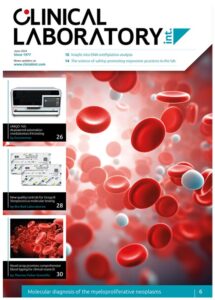Scientific literature: autoimmunity
There are many peer-reviewed papers covering autoimmunity, and it is frequently difficult for healthcare professionals to keep up with the literature. As a special service to our readers, CLI presents a few key literature abstracts from the clinical and scientific literature chosen by our editorial board as being particularly worthy of attention.
Unraveling multiple MHC gene associations with systemic lupus erythematosus: model choice indicates a role for HLA alleles and non-HLA genes in Europeans
Morris DL et al. A J Hum Genet. 2012; doi: 10.1016/j.ajhg.2012.08.026.l
In order to determine the association with both SNPs and classical human-leukocyte-antigen (HLA) alleles, a meta-analysis of the major-histocompatibility-complex (MHC) region in systemic lupus erythematosus (SLE) was performed. Results from six studies and well-known out-of-study control data sets were combined, providing 3701 independent SLE cases and 12 110 independent controls of European ancestry. The study used genotypes for 7199 SNPs within the MHC region and for classical HLA alleles (typed and imputed). The results from conditional analysis and model choice with the use of the Bayesian information criterion showed that the best model for SLE association includes both classical loci (HLA-DRB1*03:01, HLA-DRB1*08:01, and HLA-DQA1*01:02) and two SNPs, rs8192591 (in class III and upstream of NOTCH4) and rs2246618 (MICB in class I). The authors’ approach was to perform a stepwise search from multiple baseline models deduced from a priori evidence on HLA-DRB1 lupus-associated alleles, a stepwise regression on SNPs alone, and a stepwise regression on HLA alleles. This enabled them to identify a model that was a much better fit to the data than one identified by simple stepwise regression either on SNPs alone [Bayes factor (BF) > 50] or on classical HLA alleles alone (BF > 1,000).
Cellular targeting in autoimmunity
Rogers JL et al. Curr Allergy Asthma Rep. 2012; doi: 10.1007/s11882-012-0307-y.
Many biologic agents that were first approved for the treatment of malignancies are now being actively investigated and used in a variety of autoimmune diseases such as rheumatoid arthritis (RA), antineutrophil cytoplasmic antibody (ANCA)-associated vasculitis, systemic lupus erythematosus (SLE), and Sjogren’s syndrome. The relatively recent advance of selective immune targeting has significantly changed the management of autoimmune disorders and in part can be attributed to the progress made in understanding effector cell function and their signalling pathways. This review discusses the recent FDA-approved biologic therapies that directly target immune cells as well as the most promising investigational drugs affecting immune cell function and signalling for the treatment of autoimmune disease.
Mechanisms of premature athero-sclerosis in rheumatoid arthritis and lupus
Kahlenberg JM & Kaplan MJ. Annu Rev Med. 2012; doi: 10.1146/annurev-med-060911-090007.
Rheumatoid arthritis (RA) and systemic lupus erythematosus (SLE), the two most common systemic autoimmune disorders, have both unique and overlapping manifestations. One feature they share is a significantly enhanced risk of atherosclerotic cardiovascular (CV) disease that significantly contributes to morbidity and mortality. The primary mechanisms that drive CV damage in these diseases remain to be fully characterized, but recent discoveries indicate that distinct inflammatory pathways and immune dysregulation characteristic of RA and SLE are likely to play prominent roles. This review focuses on analysing the major mechanisms and pathways that are potentially implicated in the acceleration of atherothrombosis and CV risk in SLE and RA, as well as in the identification of putative preventive strategies that may mitigate vascular complications in systemic autoimmunity.
The role of epigenetic mechanisms and processes in autoimmune disorders
Greer JM & McCombe PA. Biologics 2012; 6: 307–27. l
The lack of complete concordance of autoimmune disease in identical twins suggests that non-genetic factors play a major role in determining disease susceptibility. This review considers how epigenetic mechanisms could affect the immune system and effector mechanisms in autoimmunity and/or the target organ of autoimmunity and thus affect the development of autoimmune diseases. The authors also discuss the types of stimuli that lead to epigenetic modifications and how these relate to the epidemiology of autoimmune diseases and the biological pathways operative in different autoimmune diseases. Increasing our knowledge of these epigenetic mechanisms and processes will increase the prospects for controlling or preventing autoimmune diseases in the future through the use of drugs that target the epigenetic pathways.


